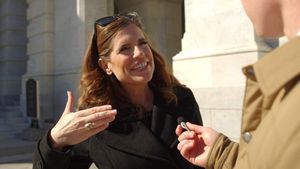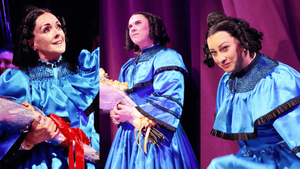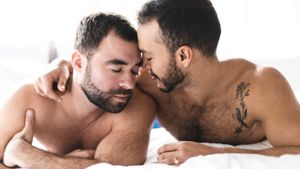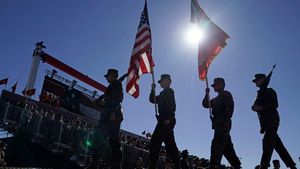A long, long time
ago, when Christianity was still in its Jewish phase
and its adherents were few and generally landless,
hospitality was an issue of morality. The outsider was
welcomed into the community and into the home as a
guest because tribal warfare and the harsh climate meant
anyone left outside the city wall could be dead by morning.
Deny hospitality, and the outsider's misfortune
was on your conscience.
The notion of
"welcome" is often on my mind because
I'm on a bus traveling to the most inhospitable
places in this country for LGBT people. As codirector
of the west bus, one of two buses crossing the United
States this spring in the second annual Soulforce Equality
Ride, I am leading 25 young adults in the conversation
of sexuality and faith on Christian college campuses
from Indiana to California to Idaho.
All of these
schools (14 on the west route and 18 on the east route) are
antigay in policy and creed. Their handbooks indicate that
LGBT students are to be expelled; they also
engage in the dangerous practice of legislating
religion. To use their words, these schools are strangling
the Holy Spirit. Their policies communicate to the students
that their faith journey cannot involve loving nor
affirming LGBT people. It is a position that
is antithetical to both religious freedom and academic
freedom.
We have been on
the road for only two weeks of our two-month
journey, and the responses have nearly given us whiplash.
Notre Dame
University in South Bend, Ind., refused to negotiate a
Soulforce Equality Ride visit in any way. My calls were
never returned, and my various letters, e-mails, and
faxes were similarly ignored time and again.
The assistant to my contact at Notre Dame expressed
her confusion that I would keep trying when I had
already been told "no." These administrators, I have found,
have been heeded for so many years that they are
confounded when someone my age, looking and sounding
like a college student, does not take "no" for an
answer.
One day while we
were at Notre Dame, two brave students stood up in the
cafeteria and offered the Soulforce Equality Riders a
welcome on behalf of the university, and then gave
their testimony as queer students at Notre Dame.
Plainclothes security officers started haphazardly handing
out trespassing warnings. When we returned the next day to
deliver floral wreaths to a memorial statue for a gay
Navy veteran on the campus, six of us were arrested,
and two students were given "summons for notice of
possible expulsion."
Holding the banner at Notre Dame
Wisconsin
Lutheran College in Milwaukee followed that with an even
more definitive response. While Notre Dame ignored us
until we had a voice on campus, WLC made it clear four
months ago that we were not welcome at all. Twenty of
us stood vigil just outside their stone walls, getting
splashed by the cars coming and going from campus. The
remaining five met with administrators and selected
students off campus at a hotel on the outskirts of
town, which sent a clear message to the students:
Culturally divisive conversation about sexuality and faith
belongs far away from the academic institution. It
sounds seedy, and it was.
WLC had told the
Equality Ride that we were not allowed on campus; but
they told their students that we would be allowed on
campus--just not into any buildings, which would
be protected by two guards at every door. They told
the students there would be a tempered, prejudiced
welcome. But to the Soulforce Equality Ride they showed a
face no different than the stone walls around campus.
We walked onto campus the second day to hold prayers,
set up tables, speak with students, and attend chapel.
We were all instructed to leave immediately. Six of
us were arrested for standing outside the chapel door,
and three were cuffed and taken away right in front of
30 WLC students, many of whom stood in tearful shock
at how their college was treating us.
MidAmerica
Nazarene University just outside Kansas City, Mo., has
a very different definition of welcome. They invited
us in without fear of reprisals. The school's
president has been traveling to visit church elders
and other influential people within the school heirarchy for
the last three months to defend his decision to
officially sanction the Equality Ride visit. He made
no small sacrifice to do the Christian thing and
welcome the outsider. We presented in classrooms,
participated in a plenary session, were hosted by
students, and shared breakfast, lunch, and dinner on
the campus.
Riders praying outside locked chapel doors at Wisconsin Lutheran
Two rare things
happened at MNU. First, the school allowed us to speak
uncensored. Schools often feel the need to reiterate
their stance, which is already maintained every day of
the year by traditional church teachings and school
policy, just after our last word. It is as though the
administrators fear the students will forget what they have
been taught all their lives, or that the donors and
parents will accuse the school of being morally
irresponsible. School presidents have in fact
told me that unequivocally. Second, the pastor at MNU
thanked us for coming to his school. We are sometimes
thanked for our decorum, our intellectual
preparedness, or our ability to keep our word. But never
before have we been thanked for being an educational
opportunity.
So there it is:
three Christian schools and three different notions of
hospitality. The first passively welcomed us as long as our
stories and our struggle were kept silent. That
is not a welcome to us as human beings. The
second approach assumed the worst in us and
refused any kind of welcome, even though they lied to their
students because they knew that locking us out was
immoral. The third put faith in us, took a chance on
the outsider, and welcomed us in to be heard and
acknowledged. MidAmerica Nazarene was, of course, the most
transformative place for the Equality Riders and
the students because of this school-sanctioned
hospitality.
Thinking back to
the ancient Jewish people, I wonder how that religion
went from being the creed of so few to a dominant
religion today. I would argue that being welcoming
made it a viable faith. By continuing to open the door
to let in other religions, people with different skin
colors, and women helped keep Christianity faithful to
principles, not conventions. Challenging itself to
function according to values rather than to dogma
has made Christianity pliable and adaptable--not
completely, of course, but enough to survive and convince a
few adherents along the way.
Will the door
open a little wider again to let lesbian, gay, bisexual,
and transgender people into the club? Our job on the
Soulforce Equality Ride is to bring the universal
themes and teachings of faith down into the practical
realm, where they are being used against LGBT people rather
than to embrace us in the long-standing tradition of
hospitality.




































































Charlie Kirk DID say stoning gay people was the 'perfect law' — and these other heinous quotes